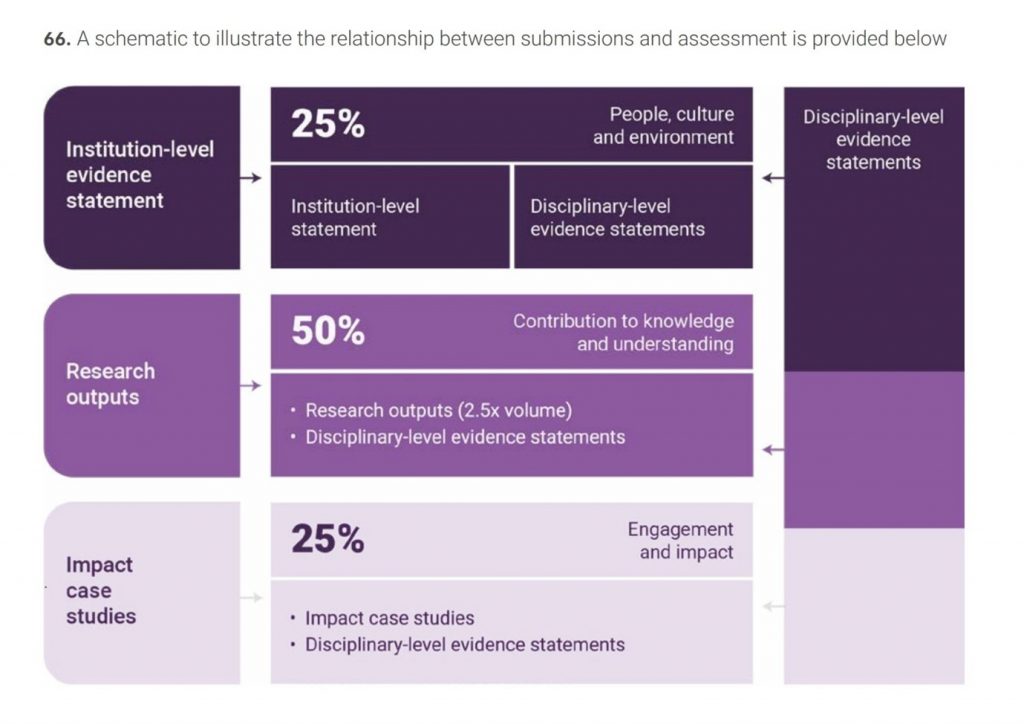Redesigning Research Assessment
19 June 2023 | Author: Hollydawn Murray, Head of Open Science, Research Culture, & Impact
Last week saw the release of the highly anticipated initial decisions by the Future Research Assessment Programme, which unveils the suggested structure of the forthcoming Research Excellence Framework (REF) in 2028. Hollydawn Murray, Head of Open Science, Research Culture and Impact, discusses the important developments and what they mean to HDR UK.
The REF is the largest national review of university research in the world. Put simply, panels of experts review submissions made by universities. Their assessments are then used to inform how much research funding a university receives from the public purse – and are often used in ‘league tables’ to rank universities and attract talent.
As a result, the REF exerts substantial influence on research culture in the UK; behaviours and attitudes across individual, discipline, and institute levels are shaped by how success is defined, as well as whom and what is valued.
HDR UK has always strongly advocated for inclusivity in research assessment and recognises the range of research, roles, and cultures that enable impact. That is why we are pleased that the early direction of travel for the next REF reflects what we deem as vital to our success – and the success of health data science more broadly.
Whilst there remain ‘a number of matters on which further consultation and work is needed‘, there are several very important developments in the high-level framework for REF2028 which, if done well, have real potential to shift ‘what’ and ‘who’ is recognised.
Evolving our approach

Key changes include a greater emphasis on research culture, and recognition of the diverse people and outputs that drive impact. This is great news for organisations like HDR UK who are pushing for responsible and inclusive research assessment (and like HDR UK have joined the Coalition for Advancing Research Assessment).
We have been taking steps to redesign how research is assessed to support and celebrate the diverse range of skills in health data science, as shown through:
- Our Technician’s Commitment action plan
- Hidden Role awards to programme managers, administrative staff, PPIE leads, and technologists
- The way we assess all types of research outputs using novel criteria founded in good research practice including open science, team science, public and patient involvement and engagement, equality diversity and inclusion, and more via HDR UK’s Impact Committee.

In late 2022, with buy-in from the community, we co-produced an Institute-wide definition of impact and supporting framework. This framework brings together the broad range of activities through which HDR UK achieves its mission and is intended to guide our community in identifying the potential outcomes and impacts of their work over the next five years.
In line with our ambitions to redesign research assessment, the framework captures the value of team science in producing impact – and the culture that enables this. Of note, the framework is not meant to constrain impacts and programmes may make impacts across several areas.
The framework is a work in progress; it presents a shared understanding that we hope will inspire further input from our community, partners, peers, and beyond. We welcome your questions comments and suggestions.
Continuing to move the dial
Whilst undertaking work on the Impact Framework and seeking feedback on HDR UK’s first five years, a key message emerged from our community with regard to research assessment: narratives supporting impact are crucial and provide much-needed nuance to complement quantitative assessments of impact.
To move the dial, our Impact Committee (comprised of Early Career Researchers from across roles, disciplines, and geographies) are leading the development of a narrative impact assessment captures, understands, communicates, and celebrates impact across the Institute’s programmes. Much like the initial decisions put forward for REF2028, the Impact Committee is committed to ensuring that:
- Research culture is captured and counted
- Impact is decoupled from researchers – with a focus on team science and the many roles (both academic and beyond) that enable impact
- Impact is broad and holistic – and inclusive of the diversity of outputs beyond publications such as whitepapers, code, workflows, and more.
Have your say
Whilst HDR UK itself does not participate in the REF, we are keen to support our many partners and community members who do – through our collective voice. This presents a key opportunity to provide feedback on practical challenges to implementation, potential mitigations, unintended consequences, impacts on ECRs, and more. If you’d like to contribute to HDR UK’s response to the REF2028 initial decisions, please get in touch.
Further reading
Noting this is a non-exhaustive summary of the initial decisions and does not touch on decisions relating to Equality, Diversity and Inclusion – further blogs highlighting key messages and thinking include:
- A clap for the FRAP (Research Professional News)
- REF2028 could revolutionise research culture (Wonkhe)



